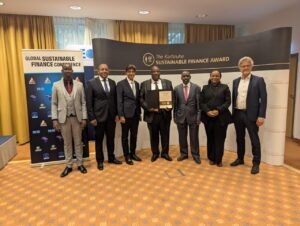By Zablon Oyugi, September 24, 2025 – The Kenyan government has reaffirmed its commitment to strict border and market surveillance to prevent withdrawn pesticides from re-entering farms and food supply chains.
Speaking at the opening of the GLOBALG.A.P. Tourstop 2025 in Nairobi on Tuesday, Mr. Fredrick Muchiri, Chief Executive Officer of the Pesticide Control Products Board (PCPB), emphasized that all pesticides whose manufacture and use have been suspended remain withdrawn and that the government has not reversed any of those decisions.
“Since withdrawing more than 200 pesticide products from the market, we have intensified surveillance at markets and entry points to ensure they are neither manufactured, imported, nor used in Kenya,” Muchiri said.
The government had, in June this year, banned 77 pesticide products and imposed strict restrictions on over 200 others in a sweeping regulatory overhaul aimed at protecting public health, ensuring food safety, and promoting sustainable agriculture.
The regulator noted that trained officers have been stationed at border points to ensure only approved products enter the country. In addition, regional officers regularly inspect agrovets to track down non-compliant products, seize them, and follow through with investigations and prosecutions.
“To strengthen enforcement, we are working closely with the Directorate of Criminal Investigations (DCI). We currently have two DCI officers based at our Loresho head office in Nairobi to support investigations and arrests linked to counterfeit products. At the same time, we continue to sensitize border officers on how to identify fake products and take legal action against offenders,” the CEO added.
Beefed capacity
Although there may be gaps in staffing and equipment for market surveillance, Muchiri noted that PCPB’s capacity to monitor and address cases has been significantly strengthened.
This follows the construction on a modern laboratory at the headquarters to help in the analysis of pesticides and generate critical data for decisions making and expedite enforcement actions.
“At present, we have managed to reduce the presence of withdrawn products in the market by 70–80 per cent. The remaining 20 per cent is mainly linked to challenges at long border points, where cross-border agrovet shops run by traders from neighbouring countries pose considerable difficulties,” Muchiri said.
Some of these shops, he said, have been supplying banned products to Kenyan farmers, particularly those cultivating tomatoes and maize in areas such as Loitokitok.
He added that PCPB has turned to digital platforms and the media to raise public awareness on banned and restricted products, while also promoting the responsible use of pesticides.
Offering trainings
According to Mr. Eric S. Kimunguyi, the Chief Executive Officer (CEO) of aak-GROW/CropLife Kenya, new pests and diseases are continually emerging as farmers diversify into different crops, creating a need to manage the situation using all available tools, including recommended chemical products.
“Given these emerging challenges brought about by climate change and other factors, we must think outside the box by training and certifying Spray Service Providers (SSPs) to complement the limited county personnel tasked with offering extension services, such as guiding farmers on pesticide use,” said Eric.
Already, aak-GROW, in partnership with PCPB, has trained county staff from Lamu and Narok, with the selection of these counties guided by risk priority factors.







